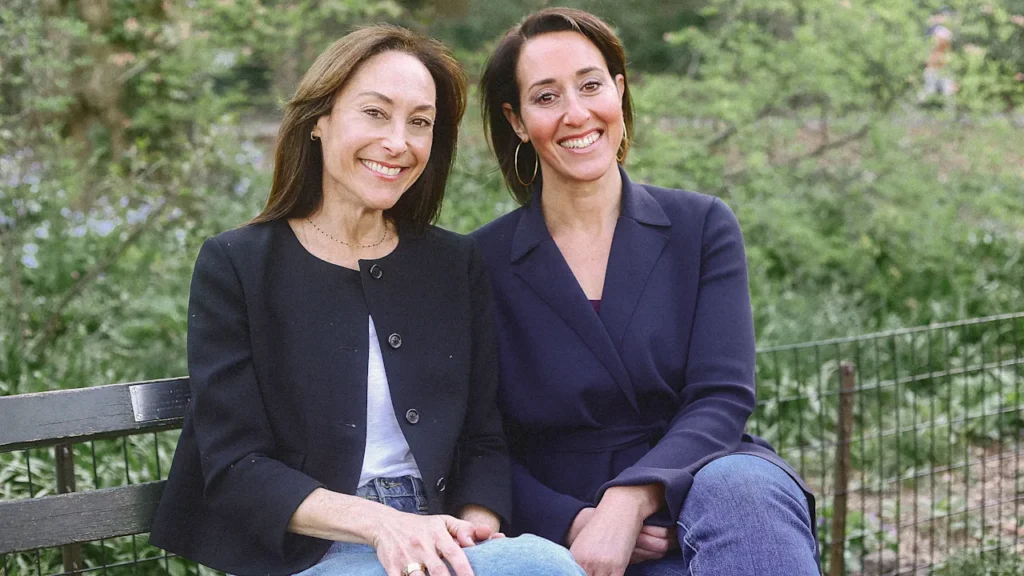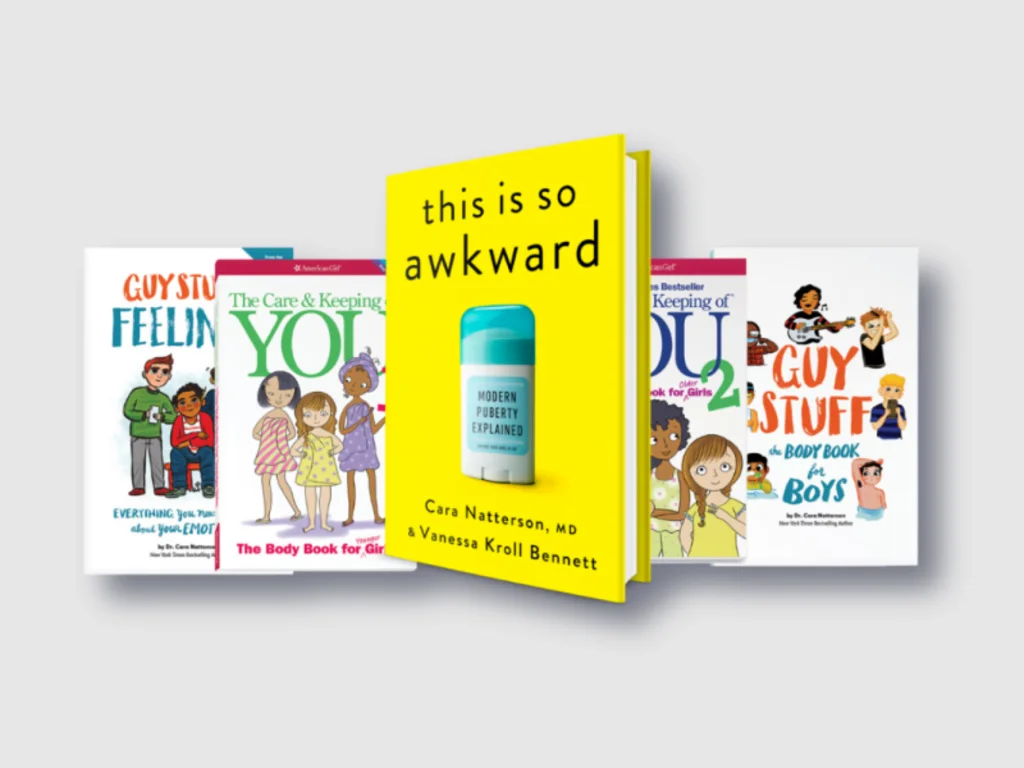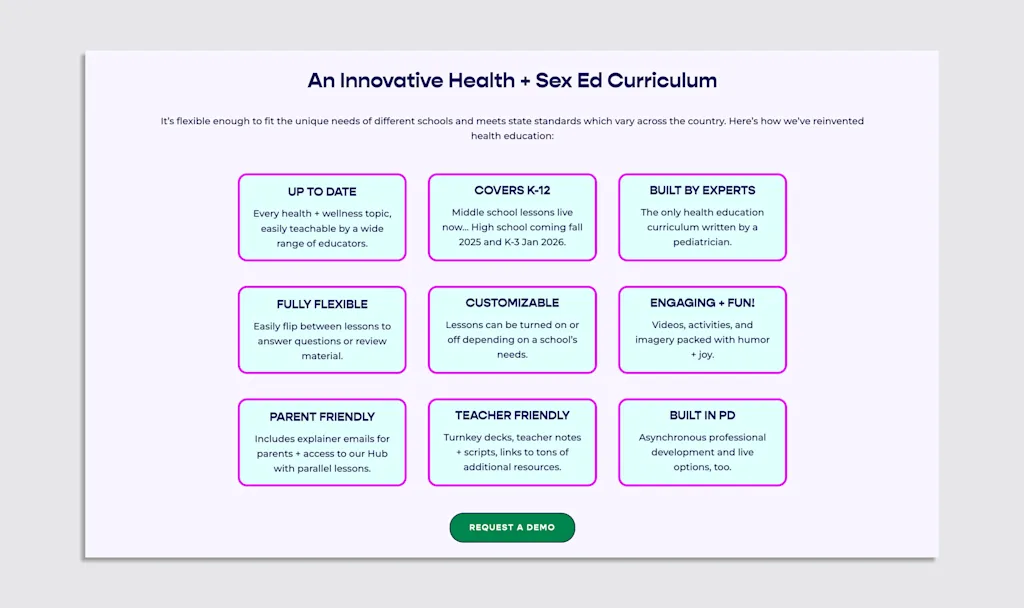
As a mother of two little girls, I expected that puberty would be a tempestuous time for our family, full of emotional roller coasters and bodily changes. I just didn’t expect it to happen so soon.
When my oldest daughter turned 9, her pediatrician said she could get her period within the year. I was blindsided: When I was growing up, girls expected to get their periods around the age of 13. I rushed out to buy a pack of menstrual pads to keep in her backpack, in case she gets her first period in school, and ordered The Care and Keeping of You, the iconic puberty guide that has sold 8 million copies since it debuted in 1998.
I’m far from the only flummoxed parent. Generation Alpha girls—the oldest of whom are just entering middle school—are expected to go through puberty between six months and two years earlier than their parents. But don’t panic. Help has arrived in the form of Less Awkward, a company that provides resources that allow children, parents, and schools to better navigate puberty.
Less Awkward is the brainchild of a pediatrician, Cara Natterson, who has written extensively about puberty (including serving as the medical consultant on The Care and Keeping of You), and a puberty educator, Vanessa Kroll Bennett, whose career has been devoted to helping girls build self-esteem.
In the past, parents could look back at their own adolescence as a guide for what might happen to their children, but today’s kids are experiencing adolescence differently than any previous generation. And while there’s an abundance of resources for early childhood, it’s far harder to find reliable information about how to navigate this brave new world of puberty.
Many parents today are looking for reliable parenting information beyond books, and through other forms of media such as apps, podcasts, Instagram, and TikTok. Dr. Becky Kennedy, a guru for parents of young children, has mastered the art of speaking to Gen Z and millennial parents on social media and through her new AI-powered app that provides parents with answers tailored to their specific problems. Natterson and Bennett are following a similar playbook, picking up where Dr. Becky leaves off, and guiding families through the transitions children will face between the ages of 8 and 18. It’s an approach that seems to be resonating with parents, who are willing to pay to use these services.
Natterson and Bennett started Less Awkward in 2021 as a podcast called This Is So Awkward. And as their audience has grown to more than 2.5 million listeners a month, so have their ambitions.
They recently turned Less Awkward into a full-fledged resource for parents with puberty-aged children, including a $10 a month hub that gives them access to videos, workshops, and even an AI chatbot that allows parents to ask specific questions and receive answers trained on Less Awkward content. And this year, they’re expanding into schools with a curriculum meant to improve the way kids learn about puberty.
Given the relative lack of resources for parents of tweens and teens, Natterson and Bennett want to provide trustworthy, evidence-based advice that is tailored to the very unique circumstances today’s kids are facing. But it turns out, this is also a recipe for a new kind of parenting business. “There is this wide open lane,” Bennett says. “We wanted to fill it quickly because we believe we can change a child’s trajectory if we can surround them with empathy and community during these years, rather than ignoring or judging them.”
The Brave New World of Puberty
Over the past five years, the media has been flooded with unsettling stories about how puberty is shifting earlier. In 2022, The New York Times reported that girls were developing breasts as young as 6. Last year, NPR described how more girls were getting their periods before the age of 9. Parents everywhere began to panic.
Doctors have been observing this trend for several decades now. In 1997, Marcia Herman-Giddens, then a physician’s associate in the pediatric department at Duke University Medical Center, published a longitudinal study of 17,000 girls, which found that they were hitting puberty at the age of 10, a year earlier than girls in the 1960s. Many studies since have found that all over the world, puberty in girls has dropped by about three months per decade since the 1970s. We see a similar pattern, though less extreme, in boys.
Researchers don’t fully understand why this is happening. But newer studies—the ones which newspapers have covered in recent years—suggest that earlier puberty may be the result of obesity, childhood stress, and the use of hormone-disrupting chemicals in our personal care products. All of this set off alarm bells.
As puberty experts, Natterson and Bennett are very familiar with these studies. But as they saw the panic this news provoked among adults, they were concerned about how little attention people were paying to the kids going through this new experience of puberty. “There was so much Monday morning quarterbacking about what’s causing this earlier puberty,” Bennett says. “What we cared about was the 45 million kids going through puberty right now. They need reliable information from adults who aren’t freaking out.”
When they looked around, they couldn’t find many resources for parents and kids trying to navigate these years. Natterson, who helped write the updated version of The Care and Keeping of You, arguably the most influential puberty guidebook on the market, believed that families were craving more knowledge and guidance—particularly since puberty itself is evolving. But while there is an abundance of resources about each stage of early childhood, there are relatively few resources for tweens and teens. “The parent industry drops kids like hot potatoes after kindergarten,” Natterson says.
Natterson and Bennett have theories about why this is the case. For one thing, many adults today dealt with the trials of puberty on their own, without much support from their parents or communities, so they assume their job is to distance themselves from their children during these years. There are also many cultural stereotypes that teenagers are intolerable, prone to violent mood swings, and rude to adults. Even some doctors and psychologists avoid working with adolescents. “It’s an intimidating stage of life,” Bennett says. “It’s unpredictable. And people are scared of dealing with young people’s reactions.”
Dr. Rebekah Fenton, who specializes in adolescent medicine (and has no connection to Less Awkward), observes that many pediatricians are not very comfortable speaking with teens, and she wishes there were more resources for them to learn how to speak with older patients. “When we’re dealing with older children who are seeing changes in their own bodies, we really should be having conversations with them directly,” she says. “But there’s a gap in our training when it comes to learning how to speak with teens.”
Making It Less Awkward
Less Awkward began as a pandemic project. In 2021, in the midst of the lockdown, Natterson and Bennett poured their energies into launching a podcast targeted at parents called This Is So Awkward. They began by covering the basics of puberty today, like when a girl can expect to get her period, how to talk to tweens about sex, and why kids experience emotional swings.
The show quickly developed an audience, racking up hundreds of thousands of listeners, and Natterson and Bennett began to tackle more complex and nuanced questions about the sociocultural impacts of earlier puberty. For instance, even though girls’ bodies are developing faster, they are not more emotionally mature; yet other people might sexualize them because they look older than they are. “When strangers on the street are sexualizing 9-year-olds, this has an impact on their mental health and self-esteem,” Bennett says. “But we don’t need to assume that young girls are going to have these negative outcomes. There are plenty of things we can do to intervene.”

Soon, Natterson and Bennett were flooded with requests to conduct workshops at schools and other organizations. It wasn’t long before they couldn’t keep up with these requests. Their solution was to write a book so they could get their ideas into the hands of more people. In 2023, they published This Is So Awkward: Modern Puberty Explained. It explains the science of puberty as well as covers their approach to parenting, which is all about staying connected to children during this period and creating spaces for conversation.
Fenton believes it is critical to offer parents and kids more information about puberty and thinks it is good that Less Awkward is creating resources that are easy to digest. “The main resource families have access to these days is books, and many are very research-heavy rather than practical,” she says. “This information needs to be in a form that parents and children will be able to receive it, like social media posts, podcasts, and videos.”
Now, Natterson and Bennett are thinking about how to make their content accessible across even more formats. They’ve spent the last few years building “The Hub,” a website that makes it easy for parents to access all of the Less Awkward content, organized by theme, at a price of $10 per month.
If a parent is trying to help their child deal with acne or a friendship problem, they can search for the topic and find everything from short social media videos to long-form podcasts that address the issue. They’ve also built an AI tool on the site that is trained on all of Natterson and Bennett’s work, allowing parents to ask more specific questions and get Less Awkward-approved answers, tailored to their situations.
This approach is similar to Dr. Becky Kennedy, who became a guru to millennials during the pandemic when she started posting short-form parenting advice videos on Instagram and TikTok. This blossomed into a book called Good Inside, and more recently evolved into an AI-powered app that answers parents’ questions on the go, using Kennedy’s methodology.
Beyond the book
Natterson and Bennett are now taking their content a step further and bringing it to schools. There isn’t a standardized sex education curriculum that schools across the country use today, and there is a lot of variation in terms of what content they cover. But broadly, many educators aren’t being equipped to handle the complexities of puberty in 2025—from the fact that it is happening sooner to the ways that technology is impacting childhood.

They’ve launched a school-based health education course called That Health Class that provides teachers with the tools to educate kids from fourth grade to high school. They’ve tailored the content to each age, and go beyond biology to consider the sociocultural aspects of puberty. Fifth graders will learn about physical anatomy and periods, but there are also modules about body image, social media, and consent in relationships. By the time kids get to eighth grade, there is a module about sexually transmitted infections (STIs), and how to prevent them. “Sex ed is not reliable if its outdated,” Natterson says. “We’re trying to offer relatable content in whatever form a kid and their trusted adults can best receive it.”
The curriculum comes with decks and videos that teachers can use in the classroom, as well as professional development content for the educators. And it also gives access to The Hub, so parents can view parallel lessons, allowing them to understand what their children are learning and engage them in conversations. “The kids need to be educated about modern puberty, but so do teachers who are teaching them,” Natterson says.
While Fenton applauds Less Awkward for helping to spread knowledge about puberty and make the concept less terrifying, she hopes they—and other puberty educators—continue to make a lot of their content free. “I’m always a little worried education is available to parents who have the resources, even though every parent needs it,” she says. “We should be trying to make as much high-quality, reliable information as possible free.”
If there’s one message that Bennett wants people to take away from the whole Less Awkward approach, it’s that puberty doesn’t have to be such a difficult time for children, parents, and their teachers. In her experience, it can also be a very rich time of connection between children and their parents, laying the foundation for a deeper lifelong relationship. But to get there, we need to rewrite the cultural narrative about puberty. “We all have baggage and trauma from these years,” Bennett says. “But it doesn’t have to be like this. We can rewrite the script.”


